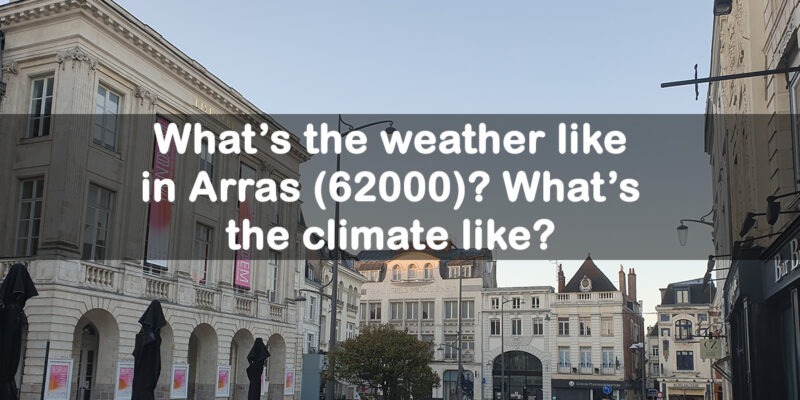Here is the weather forecast for Arras city for the next three days :
The town of Arras in the Pas-de-Calais département, at the heart of the Hauts-de-France region, has a temperate oceanic climate influenced by its proximity to the English Channel. This climate, typical of cities in northern France, is marked by moderate temperatures throughout the year and regular rainfall, especially in autumn and winter.
Whether you live in Arras or are just passing through, knowing the weather forecast is essential for planning your activities, from strolls through its famous squares to walks in the surrounding countryside.
The climate in Arras: mild and humid
The climate in Arras is characterized by a temperate oceanic regime, influenced by the proximity of the North Sea and the Atlantic Ocean. This type of climate, also known as maritime temperate, is characterized by moderate temperature variations between seasons, thus avoiding extreme variations, making it a great place to live and buy a home. In winter, temperatures drop gradually and steadily, but generally remain above the threshold for prolonged freezing. This is largely due to the influence of prevailing westerly winds, which bring relatively humid, temperate air masses from the Atlantic.
During the winter, Arras often experiences moderate cold spells, without however reaching very severe levels. Cold fronts cross the region, but are often tempered by the North Sea, which explains why cold spells are shorter and less intense than in continental regions. Winter nights can be cooler due to radiative cooling, a meteorological phenomenon in which heat escapes from the earth’s surface during clear nights, which can lead to lower temperatures, particularly in January and February. However, the days are generally temperate, with no extremes.
Conversely, summers in Arras are moderately hot, with pleasant daytime temperatures. This is due to the town’s relatively northerly latitude and the effect of ocean winds, which limit excessive temperature rises. Warm air masses from the south occasionally influence the region, but the effect is generally moderate, with temperatures rarely scorching. This summer mildness is conducive to outdoor activities, favored by a more stable atmosphere than in other seasons. In terms of precipitation, Arras has a relatively even distribution throughout the year, although the autumn and winter months are slightly wetter. This trend is due to the arrival of frequent Atlantic lows, which bring regular rainfall. Winter precipitation is often associated with rain fronts or showers generated by low-pressure systems from the west, accentuating the region’s humidity at this time.
In summer, although precipitation does diminish somewhat, it does not disappear altogether. July, in particular, can be marked by thundery showers at the end of the day, resulting from the atmospheric instability that occurs when the upper layers of the atmosphere remain colder than those on the ground. These thunderstorms, although occasional, can be intense, sometimes accompanied by strong winds or hail. This contrasts with the rest of the season, when rainfall is rarer and often localized. Sunshine is another key factor in Arras’ climate. In winter, short, often cloudy days limit exposure to the sun, with frequent low cloud layers accompanying low-pressure fronts. This reduced sunshine, combined with short daylight hours, contributes to a general feeling of greyness during the colder months. In contrast, during the summer season, long days bring generous sunshine, with extended hours of daylight, sometimes as many as 16 hours a day in June. These brighter days are ideal for tourism and outdoor activities, making summer the most popular time to explore Arras.

Time is often variable
10 and 15-day weather forecasts for Arras
Access to a 10 to 15-day weather forecast for Arras allows you to plan your daily activities or special events with precision. Whether you’re planning to visit the city for a weekend or attend iconic events such as the Christmas market or concerts on Place des Héros, consulting weather trends is a key step in avoiding unpleasant surprises linked to the vagaries of the weather. Today, thanks to numerous online tools and dedicated applications, it’s easy to obtain detailed, up-to-date weather forecasts.
Sites such as Météo France, The Weather Channel and applications such as AccuWeather and Windy offer 10- or 15-day forecasts for Arras. These forecasts are based on numerical forecasting models that integrate a multitude of data such as air mass movements, atmospheric pressure, humidity and temperature variations at different levels of the atmosphere. These models are recalculated several times a day, enabling forecasts to be constantly updated. For the next 10 days, meteorologists generally anticipate variable weather over Arras, alternating between overcast days, occasional clear spells and periods of light rain. Temperatures at this time of year remain moderate, with values fluctuating between cool mornings and milder afternoons. Winds, often moderate, blow mainly from the northwest, bringing a sensation of coolness, particularly noticeable in the shade or during cloudy spells. Although not very intense, rainy spells can be frequent, particularly at the end of the week.
These showers, generally localized, can be anticipated thanks to hour-by-hour forecasting services, enabling you to adapt your outings and travel plans in the short term. 15-day forecasts are often presented as general trends rather than precise predictions. Indeed, the longer the forecast period, the more uncertain it is. However, these trends give an idea of the conditions to come, by identifying the main features of the weather, such as the likelihood of rainy days or possible cold or mild spells.
In Arras, over a 15-day period, the weather may remain cloudy overall, with occasional clear spells, and temperatures fairly stable. In autumn and winter, it’s not uncommon to see morning fog dissipate as the day progresses, giving way to partly clear skies. To track these long-term trends, several platforms also offer interactive maps showing the evolution of low-pressure systems and anticyclones over a large part of Europe. These maps enable you to anticipate changes in the weather that could affect the Arras region, with an overview of the arrival of disturbances or sunnier episodes.

Understanding the weather in Arras
Agricultural weather in Arras: a challenge for local farmers
Arras and the surrounding area is an area of intense agricultural activity, benefiting from a rich and diversified terroir. This agricultural area (which is also one of France’s food-processing hubs), where cereals such as wheat and barley are grown, as well as vegetables and livestock, is highly dependent on climatic conditions. For the region’s farmers, agricultural weather plays a decisive role in planning sowings, managing water resources and optimizing harvests. The impact of the weather on farming schedules, particularly for field crops and livestock, is a constant concern.
Farmers in Arras keep a close eye on the weather, as it enables them to anticipate the best periods for sowing and harvesting. Long-term forecasts, often looking out 15 days, are carefully consulted to maximize productivity and limit losses due to unfavorable conditions, such as excess humidity or periods of drought. In autumn, for example, farmers keep a close eye on the arrival of rain to optimize the sowing period, especially for winter cereals. A prolonged period of wet weather can make the soil too soggy, slowing down farm work and compromising the quality of sowing. Conversely, a drier window in mid-October, for example, would make up for any delays caused by bad weather. Beyond simple temperature or precipitation volume, other meteorological indicators are of great importance to farmers. Soil moisture is an essential parameter: it determines plants’ ability to absorb water and nutrients. Soil that is too dry can limit crop growth, while excess water can lead to drainage problems and root rot, particularly for sensitive vegetables such as potatoes.
Farmers can consult specific soil moisture data via specialized agricultural weather platforms, such as those offered by Météo France, or tools like AgroMétéo, which provide fine, detailed forecasts. Wind strength and direction are also essential to farm management, particularly when it comes to spreading plant protection products and fertilizers. Strong winds, blowing at high speeds, can not only limit the effectiveness of these interventions, but also damage certain sensitive crops, such as vegetables. By monitoring weather forecasts in advance, farmers can adjust their schedule and avoid losses due to unfavorable conditions. What’s more, hour-by-hour forecasts enable even more precise management of farming activities, particularly for irrigation, when unexpected showers can interfere with the organization of work.
Agricultural weather in Arras also has a direct impact on harvesting times, particularly for cereals, beet and rapeseed. Excessive humidity at harvest time can adversely affect grain quality and increase the risk of fungal diseases. As a result, periods of mild drought, but not critical drought, are often ideal for harvesting. Vegetable crops such as leeks, onions and carrots, which are widely grown in the region, also require careful management of weather conditions to achieve optimum yields and maintain product quality. Access to agriculture-specific forecasting tools enables farmers to adapt in real time to changes in the weather. Both short-term and long-term forecasts can be used to manage critical periods such as weeding, watering or preparing the soil for the following season. In addition, seasonal weather forecast models, which anticipate major weather trends for the coming months, offer invaluable help in planning future harvests and anticipating weather risks.
Many online services offer detailed, up-to-date weather forecasts for agriculture. In addition to Météo France, specialized platforms such as Prévimétéo and lameteoagricole.net provide precise information on temperature, precipitation and wind speed, as well as soil moisture and the probability of extreme events. These tools, often accessible free of charge or via specific subscriptions, have become indispensable resources for farmers in the Arras region, enabling them to adapt their practices to weather conditions and optimize the profitability of their crops.
R.C.
